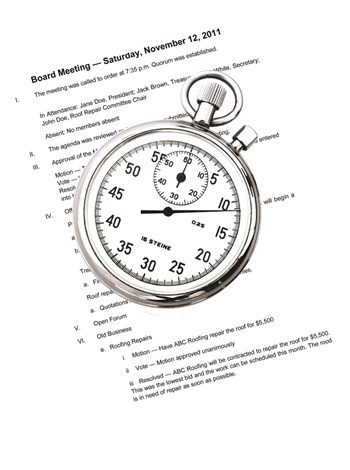
While a lot of the day-to-day business of running a condo building or HOA happens in the management office or on-site at the level of maintenance and staff management, meetings—board-only and resident alike—are the forum where important information is shared, policy formed, individual voices heard, and big decisions made.
For that and other reasons, it's crucial to keep thorough, accurate meeting minutes as a record of what goes on in your building or association's meetings.
Lawfully Recorded
Taking down meeting minutes is not only almost universally required by condo and HOA bylaws, it is also required by state law. According to Gregory M. Dyer, Esq., a Newark, New Jersey-based attorney specializing in community association law, “The New Jersey Condo Act and the Planned Real Estate Development Full Disclosure Act (PREDFDA) require that minutes of board meetings must be kept, and must be available for inspection by unit owners.”
Shareholders and unit owners “are entitled only to access in order to inspect the minutes of the meetings; physical copies are not a requirement,” adds attorney Scott B. Piekarsky, a managing member of the Wyckoff, New Jersey-based law firm Piekarsky & Associates, LLC. “Allowing access to the minutes of the meetings keeps the board’s actions out in the open and transparent,” he says.
According to David Ferullo, CPA, a senior audit partner with The Curchin Group, an accounting firm in Red Bank, New Jersey, residents should have access to the minutes of regular or annual resident meetings but they generally aren't allowed to see the minutes of board meetings. And regardless, “The association manager is not the one who should be divulging information to a unit owner,” Ferullo says. “The board should direct the management company to disseminate that information, if they want it done. They can even put it in the newsletter.” For some boards, divulging information such as meeting minutes is a regular task, done monthly. Others send out such records less frequently, such as biannually.
Boards also differ broadly in exactly how they function from association to association and day-to-day, but when it comes time for a meeting, most have the board secretary record the minutes (though some boards will allow an outside agent—such as their association manager—to record them.) It's not hugely important who physically records the minutes because ultimately the board must approve them before they're committed to the association's official records.
In or Out?
There is certainly a method—and perhaps something of a craft—to taking accurate and appropriate meeting minutes of a board meeting without doing too little, or too much. While some board secretaries take only cursory notes during meetings, others err on the side of excess, foundering under the effort of trying to record every word uttered.
As a general rule the fewer details that are seen on the record, the better. “The proper method of maintaining minutes depends on the type of meeting and whether or not the minutes are going to be published,” says attorney John J. Roman of the Palisades Park, New Jersey-based law firm of Hubschman & Roman PC. “The secretary is usually required to record what is actually done by either the board or the membership—not what is actually said by any individual. If a matter has been voted on, the vote should be recorded, as well as the issue voted on. When the minutes are going to be published, a strict record of what is done must be maintained, as well as identifying the speakers on each side of the issue. Therefore, you are not required to take down everything said word for word.”
The pros also stress that anything discussed in a meeting that has to do with pending litigation should be left off the record (to avoid more litigation). Some buildings also omit from meeting minutes any direct or explicit mentions of personnel, or of residents who are in arrears. Those people can be mentioned in minutes, but only vaguely enough so as not to potentially slander the residents, such as: “started action on the person owing three months rent.”
In short, “The only thing that has to be in the minutes are actions taken,” says Andrew Brucker, a New York City attorney. “You should include in minutes only who was in attendance, action items, who was absent and the date.” It is essential to be careful in minute-taking because of the strong possibility of error on the part of the recorder, Brucker continues. “It’s possible that the [minute-taker] might get the minutes wrong, or put in their point of view… Minutes must be carefully reviewed by the board before they're approved,” he says.
Minute-takers should remember at all times that a condo or HOA is essentially a neighborhood. A seemingly minor mistake in naming a person who shouldn’t be named in meeting minutes could cause hard feelings or even a lawsuit. With meeting minutes, experts agree that it is better to err on the cautious side. The secretary or whomever is charged with recording meeting minutes for a board can take quick, succinct minutes by narrowing in on the bare facts, as mentioned above.
“The sensible thing is for a person other than the association manager to take the minutes,” says Harold Wolf, owner of New York-based The Back Office, which provides back office services for condos, association managers and landlords. “The association manager has to give his thoughts and listen to others. If he’s taking notes, he’s lost.”
In our litigious society, the subject of what is put into minutes is so sticky that some boards now don't even allow amateurs (including managers) to tackle the job of recording at all, opting instead to have their legal counsel take the meeting minutes, to avoid any legal problems resulting from that written record. Such barrister-scribbled notes are lean indeed, and by design—but they also cost, in the form of the attorney's time.
Pinpointing Details
In addition to narrowing the chances of litigious backlash, good minute-taking can also help boards, who are prone to rambling, long-form discussions during meetings that wander all over the map and accomplish little or nothing. The minute-taking process can keep things on track by sticking to business and by keeping personal gripes about neighbors, maintenance problems with their apartments, or other unnecessary details out of the discussion. Boards need to stay on-task.
“I advise boards to try to deal with the [community] problems as businesspeople,” says Herb Rose, owner of New York-based Herb Rose Consulting, a board services firm. The board may be made up of volunteers, not professionals,” he says, “but you still have to deal with things in a business fashion. With some boards, it is a real challenge.”
Help is available for board members who want to become more professional at their unpaid, volunteer board member jobs. Smart Technologies, in Calgary, runs the helpful website www.effectivemeetings.com. Board members can find many useful tips there for how to prepare for and conduct meetings—including not having a meeting if the information to be discussed could be conveyed just as easily via a memo, by e-mail or through a brief report.
Securing Notes
The degree of access that non-board member residents have to meeting minutes differs from building to building. But as mentioned earlier, under state law, residents are only entitled to see the minutes of open meetings—not those of closed, board-only proceedings.
According to Piekarsky, “[Section] NJSA 46:8B-13 of the New Jersey Condominium Act provides in part as follows: 'At each meeting required under this subsection to be open to all unit owners, minutes of the proceeding shall be taken, and copies of those minutes shall be made available to all unit owners before the next open meeting.' The Non-Profit Corporations statute provides for the same right of inspection (see NJSA 15A: 5-24.)”
Piekarsky says it's worth noting that “The wording of these statutes only indicates that the minutes be made available. It does not specifically state that the owners are entitled to a physical copy. Having the minutes available to unit owners in the lobby seems to satisfy the ‘available’ requirement of the referenced statutes and case law.”
Residents aren't the only ones with an active interest in the goings-on of HOA meetings. Prospective buyers may want to take a gander as well. They care about the meeting minutes for a variety of reasons—to scan the financial health and business atmosphere of board meetings or even to see if there have been pre-existing problems with the apartment they are considering buying.
Regardless of how promptly they are produced upon request however, residents and would-be buyers in a community should know that meeting minutes can be redacted after they are taken. For example, if a resident requests meeting minutes for a particular date and the board agrees but wants to keep some info hidden from the resident, the board can redact those minutes prior to releasing them to the resident. Again, as with other decisions regarding a board’s meeting minutes, such a move would be made to protect the community from unneeded litigation.
In the event of a lawsuit involving a board, manager and/or resident, meeting minutes could very quickly be brought up as evidence in the legal suit.
“In every lawsuit against the board, the plaintiff always asks for meeting minutes to see what transpired,” says Brucker. “The minutes could hurt [the board] with a misstatement of facts, or too much information.”
Some experts say a good rule of thumb in minute-taking is to assume that everything recorded could be used in court. That way, minutes should be beyond reproach in the material they cover.
“Anything can be used as evidence,” Wolf says. “Whether it is accepted varies from case to case.”
Associate Editor Hannah Fons contributed to this article.






Leave a Comment